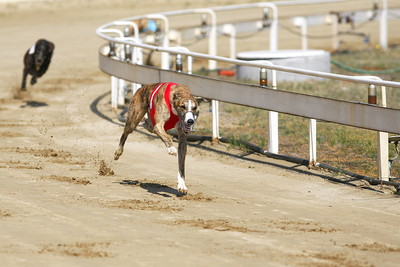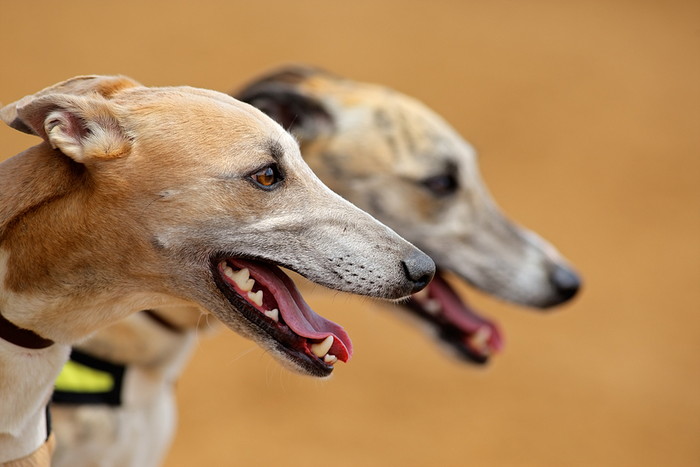 Interested in betting on greyhounds but want to reduce your risk? If this sounds like you, then place insurance is a type of bet that is worth knowing more about. Although it is something you will only find at a minority of bookmakers, there are those that will gladly accept place insurance bets across many greyhound races. The increased protection the insurance offers does come at the cost of reducing your potential winnings, but you may decide this is a price worth paying when betting on what tends to be a very unpredictable sport.
Interested in betting on greyhounds but want to reduce your risk? If this sounds like you, then place insurance is a type of bet that is worth knowing more about. Although it is something you will only find at a minority of bookmakers, there are those that will gladly accept place insurance bets across many greyhound races. The increased protection the insurance offers does come at the cost of reducing your potential winnings, but you may decide this is a price worth paying when betting on what tends to be a very unpredictable sport.
Keep reading to find out how exactly place insurance bets work and whether they can give you extra piece of mind when placing your bets on the dogs.
How Does Place Insurance Work?

The most standard type of bet to place on a greyhound bet is a ‘win only’ bet. With this you will simply select the dog you think will win the race and place your bet either at the odds given or at the starting price (SP). If it wins, you will score a guaranteed profit but if it fails to finish anywhere other than first, the bookie will end up keeping your entire stake. It is therefore very much an all or nothing way of betting but this approach may not suit everyone.
This is where place insurance comes in handy as it creates a third outcome. In this scenario, if you back a dog to win with place insurance and it finishes in the places (but doesn’t win) you get your stake back, meaning you do not win or lose any money. You have to decide which type of place insurance you want to opt for though. You can either select insurance that covers just second place or broader insurance that also covers third place.
In the case of the former, say you backed Bethanys Dream below and took place insurance and she won, you would be paid out as a 6/5 winner. If she came second, however, you would not win any money but your stake would be returned thanks to your place insurance.
Bethanys Dream – 2nd Place Insurance @ 6/5, 3rd Place Insurance @ 5/6
The third place option bet works in almost the same way, only that you will get your money back if the dog finishes in second OR third place. The extra place coverage does come at a price though as the odds will always be shorter for this option. So, if your selected dog does end up winning, the payout will not be as great as it would be with just second place insurance (or of course with a straight win only bet).
What Difference Does This Make To Your Payout?

The thought of at least getting your money back should your dog get pipped to first place is quite a comforting one but it will not always work in your favour. On a luckless day where you struggle to get any winners, it means losing less money than you would have done otherwise. On a day when you cannot stop picking winners though, you will end up with less money in your pocket due to the reduced odds you are placing your bets at. To see a representative race of how place insurance impacts payouts, here is one race taken from Owlerton Stadium in Sheffield, showing the odds for each bet type and the potential returns from a £5 stake
| Dog | Win Only | 2nd Place Insurance | 3rd Place Insurance |
|---|---|---|---|
| Bethanys Dream | 15/8 returns £14.37 | 6/5 returns £11 | 5/6 returns £9.16 |
| Sonnet Sky | 3/1 returns £20 | 5/2 returns £17.50 | 13/8 returns £13.12 |
| Drumdoit Daisy | 10/3 returns £21.66 | 11/4 returns £18.75 | 15/8 returns £14.37 |
| Rathbawn Paddy | 9/2 returns £27.50 | 7/2 returns £22.50 | 11/4 returns £18.75 |
| Hello Mary Lou | 5/1 returns £30 | 4/1 returns £25 | 10/3 returns £21.66 |
| One More Try | 6/1 returns £35 | 5/1 returns £30 | 7/2 returns £22.50 |
These are the total values but it is perhaps easier to get a sense of their differences by viewing them as a percentage. As you can see below, it is by betting on the favourite that you sacrifice a larger portion of the potential win. This makes sense though given that they are also more likely to fall within one of the insurance places.
| Dog | 2nd Place Insurance | 3rd Place Insurance |
|---|---|---|
| Bethanys Dream | 23% reduction | 36% reduction |
| Sonnet Sky | 13% reduction | 34% reduction |
| Drumdoit Daisy | 13% reduction | 34% reduction |
| Rathbawn Paddy | 18% reduction | 32% reduction |
| Hello Mary Lou | 17% reduction | 28% reduction |
| One More Try | 14% reduction | 36% reduction |
It can be argued that it is more useful to look at the percentage differences in profit, rather than total return as in some cases the stake contributes a very large portion of the overall money back. So, here is a look at the figures taking only the profit amounts.
| Dog | 2nd Place Insurance | 3rd Place Insurance |
|---|---|---|
| Bethanys Dream | 36% | 56% |
| Sonnet Sky | 17% | 46% |
| Drumdoit Daisy | 17% | 44% |
| Rathbawn Paddy | 22% | 39% |
| Hello Mary Lou | 20% | 33% |
| One More Try | 17% | 42% |
So, no matter which dog you decide to bet on, you will always stand to win a fair amount less with place insurance if your chosen dog wins but not so much that it makes it entirely unappealing. As for whether or not place insurance bets constitutes good value for money, there is no right or wrong answer to this as ultimately it depends on your betting record.
If you regularly back a second or third place finisher and not too many winners, then you will most likely be better off placing bets with the insurance. If however, you tend to pick winners and do not get that many second or third place finishers, relatively speaking, then the insurance is unlikely to benefit you in the long run. Sure you will get your stake back sometimes but that will not make up for the money lost in reduced winnings. Note that bookies tend to build in extra margins whenever they add any kind of insurance to their bets, so in terms of pure betting value, it is likely that taking the insurance will reduce the overall value of your bet. Ultimately though it comes down to how much risk you are choosing to take.
Of course, even when you take the place insurance on a bet, there is a fair chance your chosen dog will neither win nor finish in the places. In this case, you would of course just lose your stake.
Are Place Insurance Odds Consistent?
One thing you may be wondering about place insurance odds is, will you always get the same insurance price relative to the win only odds? Most of the time the answer is yes but this is not always the case. In some instances, you can have two dogs trading at the same price for the win but their insurance prices are a little different. Here is one example from a race at Romford in which there was a price difference on the third place insurance.
| Win Only | 2nd Place Insurance | 3rd Place Insurance | |
|---|---|---|---|
| Dog 1 | 3/1 | 5/2 | 7/4 |
| Dog 2 | 3/1 | 5/2 | 13/8 |
You will also find differences between different races. We found three 2/1 contenders during one evening and spotted that they all had slightly different place insurance places, despite each dog competing in a field of six.
| Dog | Win Only | 2nd Place Insurance | 3rd Place Insurance |
|---|---|---|---|
| Race 1 | 2/1 | 11/8 | 10/11 |
| Race 2 | 2/1 | 6/5 | 4/5 |
| Race 3 | 2/1 | 5/4 | 10/11 |
There are two main explanations for these differences. One is that odds change depending on market activity so if lots of people back a particular dog with insurance, the price would naturally shrink. The other explanation is that races are not equal in terms of their distribution of talent. Imagine you had one race with three extremely strong runners and three rather weak ones as opposed to one with a reasonable open and finely balanced field. A 2/1 favourite would be more likely to finish within the top three in the former, making the insurance more valuable.
Alternative Bets

If your bookmaker does not offer place insurance, or if you simply want something a little different, you might be wondering what options you have. Although nothing else serves the exact same purpose as a place insurance bet, there are two somewhat similar options. First you have an each way bet. This bet, as you might know, is actually two bets: one on the dog to win, the other on it to place. So a £10 each bet would cost you £20 in total. With this bet you would receive a small payout (usually ¼ of the odds) should your dog finish second, plus half of your overall stake back. It is possible to lose money on a second place finisher if the odds are short though, as you will lose the win half of your bet. Standard each way terms for a six dog race means that backing a dog at 4/1 is the break-even point. At this price you will not win, nor lose any money should your dog finish second.
The other option you may have at your chosen bookie is a ‘top finish’ bet. Now, with this bet you are paid out as a winner providing your dog finishes in the top two, or three (depending on your selection). The odds you receive for this are significantly smaller than with place insurance but it comes with the benefit that a top two or three finish pays out profit rather than simply handing your stake back. To see the exact price differences, check this race from an evening at Towcester below.
| Greyhound | Win Odds | Top 2 Finish | 2nd Place Insurance | Top 3 Finish | 3rd Place Insurance |
|---|---|---|---|---|---|
| Savana Stowe | 9/4 | 4/5 | 6/4 | 4/11 | 1/1 |
| Signet Opal | 9/4 | 10/11 | 6/4 | 2/5 | 11/10 |
| The Bruce | 5/2 | 1/1 | 15/8 | 4/9 | 5/4 |
| Darcis Rio | 9/2 | 15/8 | 7/2 | 10/11 | 11/4 |
| Oh Margarita | 11/2 | 12/5 | 9/2 | 6/5 | 7/2 |
| My Volunteer | 17/2 | 10/3 | 13/2 | 13/8 | 11/2 |
As for which bet type is best for you, it again depends on how many winners you manage to pick out. If you were to imagine a scenario though in which you backed The Bruce in three different races, each at the odds listed above, and he finishes first, second and third. This is how your winnings would differ if you bet £5 each time.
- Win only bet: £2.50 profit
- Top two finish: £5 profit
- Second place insurance: £4.38 profit
- Top three finish: £6.66 profit
- Third place insurance: £6.25 profit
Even though the returns are small on a top three finish, the fact that you always score a profit with your bet makes this the best option, at least for the scenario above. If The Bruce had a poorer run of form though and finished first, second and fifth across his next three races, the situation changes.
- Win only bet: £2.50 profit
- Top two finish: £5 profit
- Second place insurance: £4.38 profit
- Top three finish: £0.56 loss
- Third place insurance: £1.25 profit
So, there is really no better or worse bet type as it depends on how your selected dogs perform. If you are really serious about finding out the best option for you though, we would recommend tracking your bets and calculating what you would have won with each bet type (as done before). Just bear in mind though that past trends do not necessarily reflect future performance. Ultimately it is likely the bookies that offer place insurance will ensure it is profitable for them rather than the punters in the long term. But that isn’t to say that with some research you can’t find some winning bets in individual dog races.
